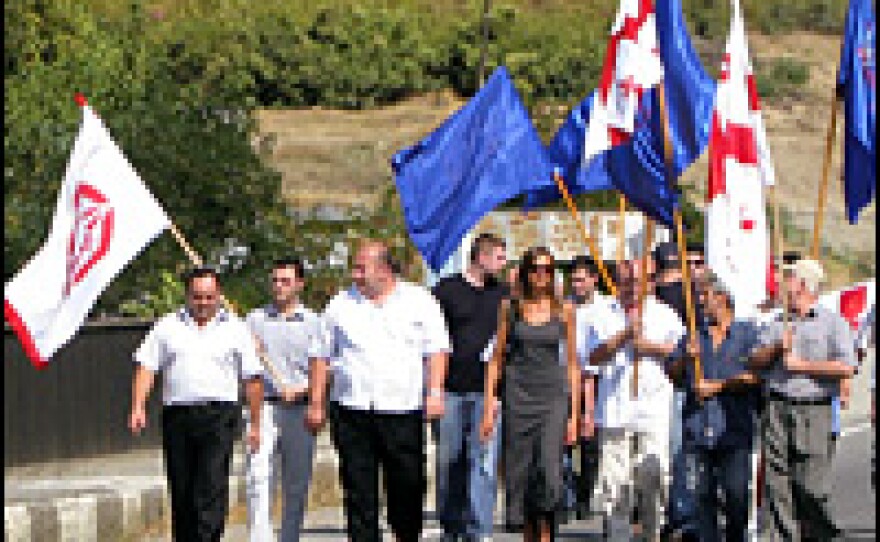
Russia shows little sign of ending its occupation of Georgia, despite signing a cease-fire agreement last week that calls for the withdrawal of Russian forces from Georgian territory.
Russia engaged in a very public show of force Tuesday in Poti, Georgia's port on the Black Sea. Russian troops entered Poti and detained at least 21 Georgian soldiers there. The Georgians were taken away, blindfolded, on top of Russian armored personnel carriers.
Checkpoint Protest
Meanwhile, only 20 miles west of the Georgian capital, Russian soldiers continued to man checkpoints and search passing cars. The Russians allowed a stream of tanks and armored vehicles, as well as humanitarian convoys delivering aid, to drive in and out of the Russian-occupied town of Gori.
But journalists and many Georgian citizens were not allowed to enter.
Last week, after just a few days of fighting, the Russians easily overwhelmed Georgia's small military. Some Georgians have since found new ways to show their defiance.
George Kamrolidze is one of about 20 members of a labor union who marched toward a Russian army checkpoint carrying Georgian flags and chanting "Sakartvelo" — the Georgian name for Georgia.
"Today we are protesting what happened in our country, because we are the victim of Russian aggression," he said. "They stepped in our soil, and so they started occupation of our lands."
At the checkpoint, a Russian officer told the protesters he had orders not to let them pass.
A protester told the officer to tell his commander that the land and the road belong to the Georgians.
Avoiding Provocation
"It is a tense situation," says Peter Semneby, the European Union's envoy to the Caucasus. "The withdrawal ... has not yet started, and in that situation, everybody has to be aware of the risk that any even minor incident may have consequences, and it may unleash a chain of events that would be difficult to control."
As Russian patrols push deeper into Georgian territory, the Georgian security forces have, for the most part, withdrawn peacefully, to avoid further provoking their giant neighbor.
In western Georgia, Lt. Ramazi Aphkhadze said he has orders not to fight the Russians unless they start hurting civilians.
"If they will shoot to civilian, I will fight them, kill them," he said as he stood in civilian clothes outside his army barracks, currently occupied and being destroyed by Russian troops.
A Former President's Advice
Among the voices denouncing Moscow's occupation is a Georgian who once had a prominent seat in the Kremlin. In the 1980s, Eduard Shevardnadze served as the foreign minister for the Soviet Union.
"For 200 years, we were a Russian colony," he said. "When one gets accustomed to controlling another country, it can be difficult to see that country become independent. Eventually, some people reappear who want to re-create the old order."
Several years after the breakup of the Soviet Union, Shevardnadze became president of an independent Georgia. But in 2003, he was overthrown by opposition protests led by Georgia's current president, Mikhail Saakashvili.
Speaking in the old presidential villa in Tbilisi, where he still lives, Shevardnadze said Saakashvili was unwise to try to reclaim the Russian-backed breakaway region of South Ossetia by force earlier this month.
But the 80-year-old former Soviet diplomat also had some advice for the current residents of the Kremlin, who have made no secret of their desire to see Saakashvili overthrown.
The more Russia squeezes Saakashvili, Shevardnadze said, the more his authority will grow. That, he added, is the nature of Georgians.
Copyright 2022 NPR. To see more, visit https://www.npr.org. 9(MDAzMjM2NDYzMDEyMzc1Njk5NjAxNzY3OQ001))







